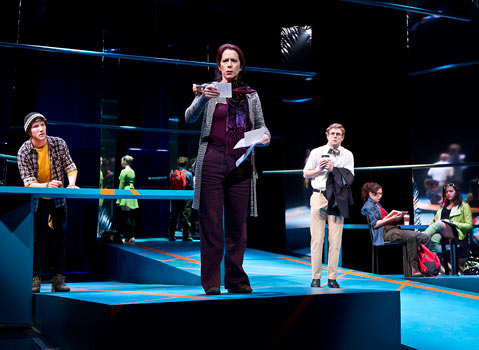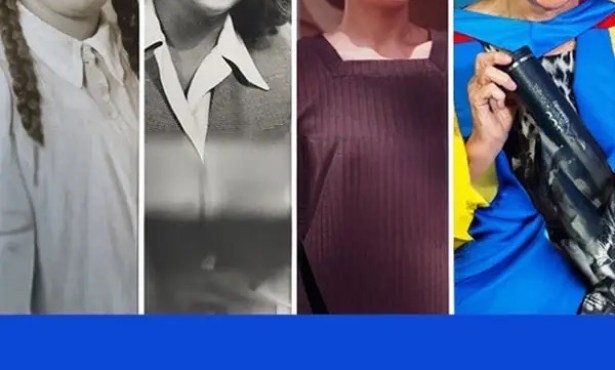Entangled at UCSB’s Hatlen Theatre
UCSB Launch Pad Premieres Work by Lila Rose Kaplan

In quantum mechanics, the term “entanglement” refers to a certain kind of influence that can take place between particles, even when they are separated by a great distance. In Entangled, which premiered on Saturday at UCSB as part of director Risa Brainin’s ongoing Launch Pad program, the term refers to an effect occurring between two human twins. Leigh and August, a dancer and a physicist, respectively (both played by the marvelous Anne Torsiglieri), are the entangled halves of an unknown whole, and the show’s conflict emerges out of their awkward and funny struggle to become both independent of one another and, at the same time, the individual parts of one whole thing.
As with the phenomenon of entanglement in physics, the action in the play starts at a distance, even before the two leads occupy the same space. Physicist August wins the Nobel Prize, thus setting off an imbalance at a distance in the personality of her sister Leigh. To illustrate this principle, we encounter Leigh first as she begins to manifest her half of the Nobel’s repercussions. Leigh, in addition to being a former ballerina, is also the head of a special boarding school, Twins Academy, which only admits exceptional twins. In the opening sequence, we see Torsiglieri as Leigh jettisoning her headmaster responsibilities in order to embrace her rebellious and creative side. In order to do this, she needs to hand over at least partial control to someone else, namely Max, her son and the Twins Academy’s history teacher. Max, well played by Garrett Ward, could hardly be more different from his demanding, seemingly confident, and often overbearing mother. His travails in his new role provide a counterpoint to the more agonizing and dynamic shifts that the two leads go through. For instance, while Leigh succeeds in seducing a young barista (Brian Bock) into observing her dance, Max overflows with excitement when the librarian he likes recommends a book about the Civil War to him.
The other characters at Twins Academy — students “Cold War” (Andrew Fromer), “MIT” (Hollie Sokol), “Fame” (Brittany Carriger), and “Bunhead” (Chase O’Donnell) — are also twins, although not played by a single actor, and are revealed to us primarily through their interactions with their new physics teacher, August, and each other. Playwright Lila Rose Kaplan has a knack for the kind of witty dialogue that powers Hollywood comedies, and her characters succeed in cracking up the audience regularly throughout Entangled’s single 90-minute act. Leigh gets many of the biggest laughs because she is the play’s most self-centered and domineering figure, a head of school capable of giving such comic instructions as, “Don’t be late, don’t be dirty, and don’t be wrong.” As Cold War, Fromer also excels at delivering well-timed one-liners, especially after he discovers love with O’Donnell’s Bunhead.
While Entangled works very effectively as entertainment — the staging in the newly renovated Hatlen Theater, with lighting by Michael Klaers and scenic design by Nayna Ramey, is ravishing — it’s not always entirely clear what it is doing as satire. Generally, when a play takes on the satirical tone that’s evident throughout Entangled, it’s in order to target the pretensions of a particular group of people or pose within society. Leigh, with her courting of youthful voyeurism and ruthless exploitation of those within her power, would seem to be the target here, but what she represents remains obscure. Perhaps the best way to understand the frequently zany humor of Entangled is through invoking the title concept again, and assuming that, through gently poking fun at the aspirations of all ambitious intellectuals, the show allows us to laugh at ourselves, but at a distance. n



